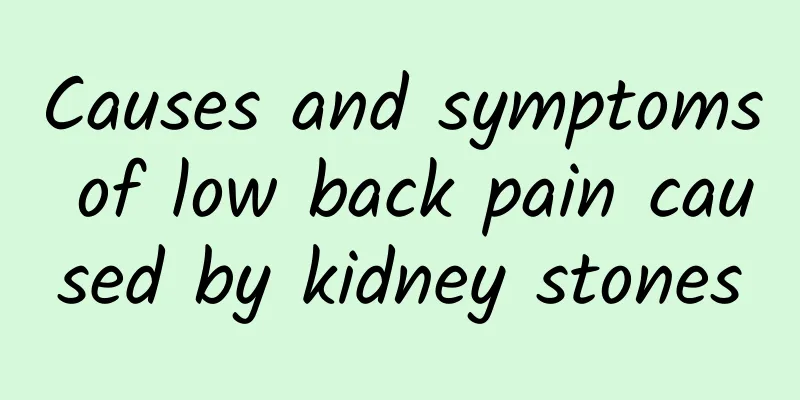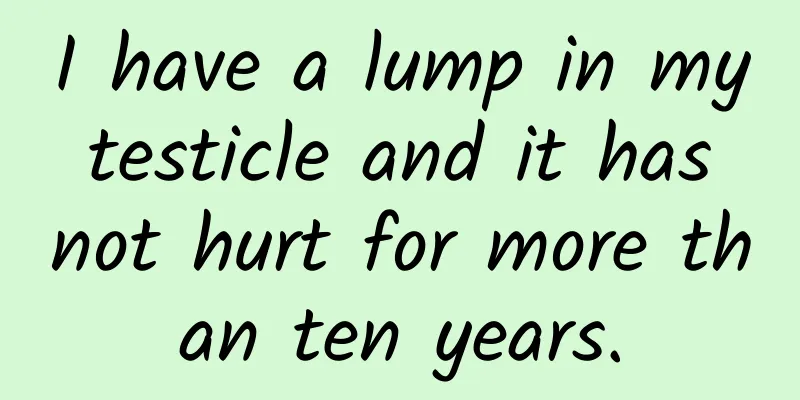Causes and symptoms of low back pain caused by kidney stones

|
Among the various causes of low back pain, low back pain symptoms caused by disease factors are also very common. Kidney stones are a common cause. So, what are the specific causes and manifestations of low back pain caused by kidney stones? Causes of low back pain caused by kidney stones: Pain is a common symptom of kidney stones. The pain of kidney stones is related to the location, shape, size, whether the kidney stones are active, the degree of obstruction, infection, etc. The pain of kidney stones can be roughly divided into colic and blunt pain. Both pain symptoms may occur at the same time, or only one of them may appear. If the kidney stones are relatively large, the pain experienced by the patient is mainly manifested as deep dull pain or dull pain. The symptoms of this pain may be caused by incomplete urinary tract obstruction of the renal pelvis, increased pressure in the renal calculus cavity, excessive tension of the renal capsule, etc., or it may be caused by local factors such as inflammation, edema, mucosal irritation, and increased peristalsis secondary to kidney stones. The pain site is mostly located in the waist ribs or lower back on the same side. Smaller kidney stones are easy to move in the renal pelvis or renal calculus, especially when they are entrapped at the renal pelvis outlet and the neck of the renal calculus, which can cause violent peristalsis of the ureter. Therefore, when the urinary tract is suddenly obstructed, renal colic is caused when the renal collecting system is pulled. When kidney stones cause back pain, it is often accompanied by gross hematuria or microscopic hematuria, with the latter being more common. Large amounts of gross hematuria are rare, and hematuria may worsen after physical activity. Patients with kidney stones may excrete sand and stones in their urine, especially when pain and hematuria occur, and the urine may contain sand or small stones. When stones pass through the urethra, they may cause obstruction or stinging. Symptoms of low back pain caused by kidney stones: The back pain caused by kidney stones is different from ordinary back pain and stomach pain. The pain caused by kidney stones occurs at a higher position, generally above the waist and on both sides of the lumbar spine. When the stones are inactive and the changes in the intrapelvic pressure are not obvious, it is usually an occasional dull pain or dull pain. When the kidney stones are active, colic occurs. In severe cases, the patient has difficulty standing up due to the pain, sweats profusely, and is accompanied by nausea and vomiting. Sometimes kidney stones move to the ureter and bladder with urine, and this pain will also reflect downward to the lower abdomen and inner thigh, accompanied by hematuria, frequent urination, urgency, and pain when urinating. |
<<: What are the main characteristics of visceral pain? These three are the most common
>>: Can crunches reduce belly fat? How?
Recommend
What foods can replenish kidney deficiency in men? What foods are good for kidney deficiency?
Kidney deficiency is a topic that men hate to tal...
What causes bacterial prostatitis?
Nowadays, many teenagers often develop the habit ...
What is the age and symptoms of male menopause?
Menopause is a word that we hear frequently nowad...
What causes testicular enlargement?
The testicle is a very important sexual organ for...
What medicine can cure premature ejaculation in men?
The problem of premature ejaculation has become a...
What happens if you don't circumcise?
Many male friends will encounter the problem of f...
Glomerulonephritis
Glomerulonephritis is also called nephritis. For ...
How to make pork liver and red dates porridge, the benefits of eating pork liver and red dates porridge
Pork liver and red dates are two foods that nouri...
Normal weight and height standards for boys
Weight standard is one of the key indicators to r...
How is the sexual function of men in their 50s?
When a man is 50 years old, the length and size o...
What is the general survival rate of sperm?
I believe everyone knows that after male ejaculat...
Is male eczema easy to treat?
Condyloma acuminatum is a relatively serious sexu...
How to exercise for back pain? These three methods are the most effective
In real life, back pain is the most common sympto...
What are the steps of hydrocele surgery?
For hydrocele of the spermatic cord, you must pay...
What is prostatic fluid? What are the functions of prostatic fluid?
The so-called prostatic fluid refers to the secre...









